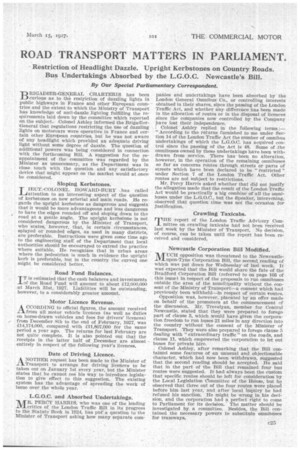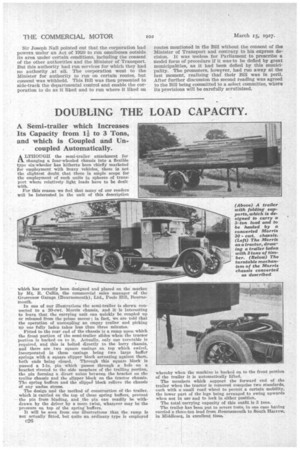ROAD TRANSPORT MATTERS IN PARLIAMENT.
Page 47

Page 48

If you've noticed an error in this article please click here to report it so we can fix it.
Restriction of Headlight Dazzle. Upright Kerbstones on Country. Roads. Bus Undertakings Absorbed by the L.G.O.C. Newcastle's Bill.
By Our Special Parliamentary Correspondent.
DRIGADIER-GENERAL CHARTERIS has been 1.)curious as to the restriction of dazzling lights in public highways in Frahce and other European countries and the extent to which the Ministry of Transport has knowledge of anti-dazzle lighting fulfilling the requirements laid down by the committee which reported on the subject.. Colonel Ashley informed the BrigadierGeneral that regulations restricting the use of dazzling lights on motorcars were operative in France and certain other European countries, but he was not aware of any headlight which provided an adequate driving light without some degree or dazzle. The question of additional powers was being considered in connection with the forthcoming Bill. A suggestion for the reappointment of ,the committee was regarded by the Minister as unnecessary, as the Department was in close touch with the question and any satisfactory device that might appear on the market would at once be considered.
Sloping Kerbstones.
TIEUT.-COLONEL HOWARD-BURY has called j attention to an interesting aspect of the question of kerbstones on new arterial and main roads. He regards the upright kerbstone as dangerous and suggests that it would be more advantageous and less dangerous to have the edges rounded off and sloping down to the road at a gentle angle. The upright kerbstone is not considered dangerous by the Minister of Transport, who states, however, that, in certain circumstances, splayed or rounded edges, as used in many districts, are preferable. Instructions were given some time ago to the engineering staff of the Department that local authorities should be encouraged to extend the practice where suitable. He recognizes that in urban areas where the pedestrian is much in evidence the upright kerb is preferable, but in the country the curved one might be considered better.
Road Fund Balances.
IT is estimated that the cash balances and investments of the Road Fund will amount to about £12,000,000 at March 31st, 1927. Liabilities will be outstanding, however, to a considerably greater amount.
Motor Licence Revenue.
A CCORDING to official figures, the amount received _Cif rein all Motor vehicle licences (as well as duties on horse-drawn vehicles and fees for drivers' licences) from December 8th to the end of February, 1927, was £14.174,000, compared with £11,807,000 for the same period a year ago. The returns for last February are not quite complete. It is also pointed out that the receipts in the latter half of December are almost entirely in respect of the following year's licences.
Date of Driving Licence.
A NOTHER request has been made to the Minister of 1.T anspor t to arrange for driving licences to betaken out on January 1st every year, but the Minister states that he cannot see his way to introduce legislation to give effect to this suggestion. The existing system has the advantage of spreading the work of issue over the whole year. • •
L.G.O.C. and Absorbed Undertakings.
MR. PERCY HARRIS, who was one of the leading eritics of the London Traffic Sill in its progress to the Statute Book in 1924, has put a question to the Minister of Transport asking how many separate corn
panies and undertakings have been absorbed by the London General Omnibus Co., or controlling interests obtained in their shares, sitice the passing of the London Traffic Act, and whether any difference has been made in the allocation of routes or in thedisposal of licences since the companies now controlled by the Company have lost their independence.
Colonel Ashley replied in the following terms:— "According to the returns furnished to me under Section 14 of the London Traffic Act the number of omnibus undertakings of which the L.G.O.C. has acquired control since the passing of the Act is 48. Some of .the omnibuses owned by these undertakings have been withdrawn from service. There has been no alteration, however, in the operation of the remaining omnibuses so far as concerns routes through streets or parts of streets which have been declared to be " restricted " under Section 7 of the London Traffic Act. Other routes are not Subject to restrictions.
Mr. Percy Harris asked whether that did not justify the allegation made that the result of the London Traffic Act would be practically a big combine of all the omnibuses under the L.G.O.C., but the Speaker, intervening, observed that question time was not the occasion for justification.
Crawling Taxicabs.
fr HE report of the London Traffic Advisory Com mittee on crawling taxicabs had not been received last week by the Minister of Transport. No decision, of course, can be taken until the report has been received and considered.
Newcastle Corporation Bill Modified.
MUCH opposition was threatened to the Newcastleupon-Tyne Corporation Bill, the second reading of which was put down for Wednesday of last week. It was expected that the Bill would share the fate of the Bradford Corporation Bill (referred to on page 103 of this issue) in respect of the proposals to run omnibuses outside the area of the munitipality without the consent of the Ministry of Transport—a consent which had previously been withheld—in respect of certain iroutes.
Opposition was, however, placated by an offer made on behalf of the promoters at the commencement of the discussion. Mr. Trevelyan, member for Central Newcastle, stated that they were prepared to forego part of clause 3, which would have given the corporation freedom to run buses 21 miles in any direction into the country without the consent of the Minister of Transport. They wexe also prepared to forego clause 5 dealing with "extraordinary traffic" on the roads, and clause 11, which empowered the corporation to let out buses for private hire.
, Colonel Ashley, after remarking that the Bill contained some features of an unusual and objectionable character, which had now been withdrawn, suggested that the second reading should be accepted. He said that in the part of the Bill that remained four bus routes were suggested. It had always been the custom that specific routes should be left for consideration by the Local Legislation committee of the House, but he observed that three out of the four routes were placed before him last year, and after local inquiry he had refused his sanction. He might be wrong in his decision, and the corporation had a perfect right to come to Parliament for its decision.. The matter should be investigated by a committee. Besides, the Bill contained the necessary powers to substitute omnibuses for tramways. Sir Joseph Nall pointed out that the corporation had powers under an Act of 1920 to run omnibuses outside Its area under certain conditions, including the consent of the other authorities and the Minister of Transport. But this authority had run services for which they had no authority at all. The corporation went to the Minister for authority to run on certain routes, but consent was withheld. This Bill was then presented to side-track the departmental control and enable the corporation to do as it liked and to run where it liked on routes mentioned in the Bill without the consent of the Minister of Transport and contrary to his express decision. It was useless for Parliament to prescribe a model form of procedure if it was to be defied by great municipalities, as it had been defied by this municipality. The promoters, howpver, had run away at the last moment, realising that their Bill was in peril. After further discussion the second reading was agreed to the Bill being committed to a select committee, where its provisions will be carefully scrutinized.












































































































